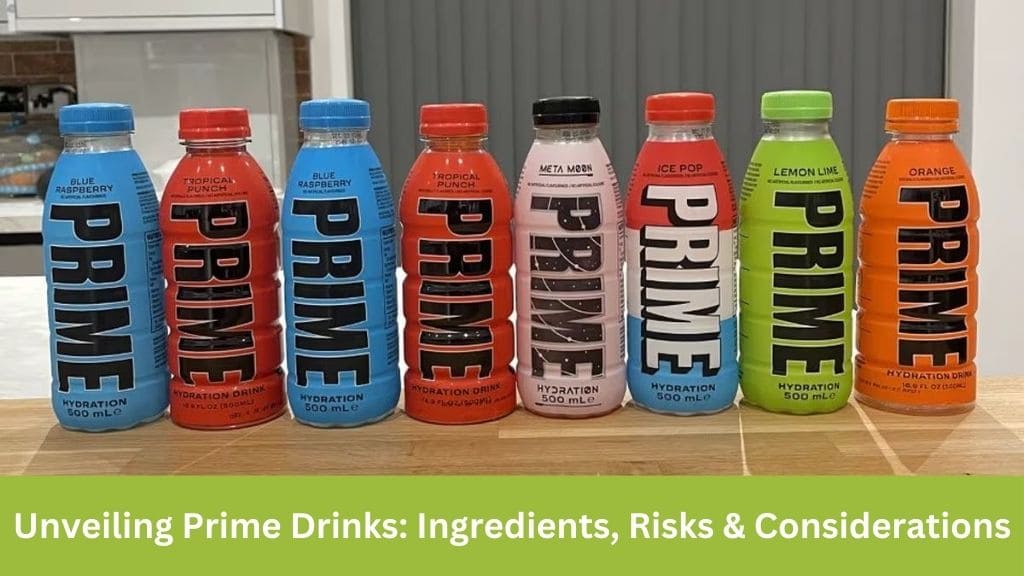In recent times, the beverage market has witnessed the emergence of Prime drinks, a brand that has garnered significant attention, especially among the younger demographic. In this blog post, we delve deep into the world of Prime drinks, exploring their ingredients, potential risks, safety concerns, and considerations for consumers.
What are Prime Drinks?
Understanding Prime: An Influencer-Backed Phenomenon
Prime drinks have surged in popularity, largely due to their endorsement by influencers and their captivating marketing strategies. With over 61 million views on TikTok and being the official sports drink of the UFC (Ultimate Fighting Championship), Prime has become a household name among young consumers.
The Controversy Surrounding Prime
Despite its popularity, Prime drinks have not been without controversy. In July 2023, Senator Charles Schumer called on the Food and Drug Administration (FDA) to investigate Prime for its marketing tactics and elevated caffeine content, sparking a debate about the safety and efficacy of these beverages.
Prime Drinks: Product Overview

Prime Hydration
Prime Hydration is marketed as a caffeine-free beverage designed to replenish electrolytes and provide hydration. Available in various flavors and formats, Prime Hydration aims to offer consumers a refreshing and replenishing drink after physical activity.
Prime Energy
On the other hand, Prime Energy is positioned as an energy drink, boasting a substantial caffeine content of 200 milligrams per serving. With its stimulating properties, Prime Energy targets consumers seeking an energy boost to fuel their day or workouts.
Ingredients and Nutritional Composition
Prime Hydration Ingredients
Electrolytes and Hydration
Prime Hydration contains electrolytes such as sodium, magnesium, and potassium, essential for maintaining fluid balance and replenishing lost minerals during exercise. However, some experts have raised concerns about its relatively low sodium content compared to other sports drinks.
Branched-Chain Amino Acids (BCAAs)
BCAAs are essential amino acids present in Prime Hydration, known for their role in muscle recovery and performance enhancement. While they can be beneficial, the exact quantity of BCAAs in Prime drinks remains undisclosed, posing challenges for consumers evaluating their efficacy.
Artificial Sweeteners and Flavor Enhancers
Prime Hydration incorporates artificial sweeteners like sucralose and acesulfame potassium to enhance taste without adding extra calories. While deemed safe for consumption, concerns persist regarding their long-term effects, especially in children and adolescents.
Prime Energy Ingredients
High Caffeine Content
Prime Energy stands out for its high caffeine content, with 200 milligrams per serving. While caffeine can enhance alertness and performance, excessive consumption may lead to adverse effects such as insomnia and increased heart rate, particularly in susceptible individuals.
Other Additives
In addition to caffeine, Prime Energy contains a blend of vitamins, electrolytes, amino acids, and artificial sweeteners. These ingredients collectively contribute to its stimulating effect and flavor profile, catering to consumers seeking an energy boost.
Safety Concerns and Regulatory Scrutiny
Sen. Schumer’s Call for Investigation
The controversy surrounding Prime drinks intensified when Senator Schumer urged the FDA to investigate the brand’s marketing practices and caffeine levels. Concerns were raised regarding the potential impact of Prime Energy on young consumers and its alignment with regulatory guidelines.
Caffeine Intake and Health Risks
While caffeine consumption within recommended limits is generally considered safe for adults, excessive intake, especially among adolescents, can pose health risks. Prime Energy’s high caffeine content raises concerns about its suitability for young consumers and its potential adverse effects on health.
Regulatory Landscape and Consumer Protection
The regulatory oversight of energy drinks like Prime Energy remains a topic of debate, with calls for stricter guidelines to safeguard consumer health. As consumers become more discerning about the products they consume, regulatory agencies play a crucial role in ensuring transparency and safety in the beverage industry.
Considerations for Consumers

Assessing Individual Needs and Preferences
Consumers are encouraged to evaluate their health status, dietary habits, and tolerance to caffeine before consuming Prime drinks or similar beverages. Understanding one’s nutritional requirements and consulting healthcare professionals can help make informed decisions about beverage choices.
Exploring Alternatives
For individuals wary of the ingredients or caffeine content in Prime drinks, exploring alternative beverages with similar functionalities may be beneficial. Brands offering electrolyte-rich sports drinks or natural energy-boosting beverages provide viable options for consumers seeking healthier alternatives.
Advocating for Transparency and Accountability
As consumers demand greater transparency from beverage manufacturers, advocating for clearer labeling and disclosure of ingredients becomes paramount. By supporting brands committed to transparency and responsible marketing practices, consumers can drive positive change in the industry.
Conclusion
Prime drinks have undoubtedly made their mark in the beverage industry, captivating consumers with their innovative formulations and marketing strategies. However, amidst the allure of Prime Energy’s stimulating effects and Prime Hydration’s replenishing properties, consumers must prioritize their health and well-being.
By critically assessing the ingredients, nutritional composition, and regulatory scrutiny surrounding Prime drinks, consumers can make informed choices that align with their individual needs and values. Whether opting for Prime drinks or exploring alternative beverages, the key lies in striking a balance between enjoyment and responsible consumption.
I’m Chen Mina, from Vol de Nuit, who has a special passion for bartending, especially mixing wine, beer, and cooktail. Here you will find content about alcoholic beverages, I will bring you knowledge that few people know about this drink.





